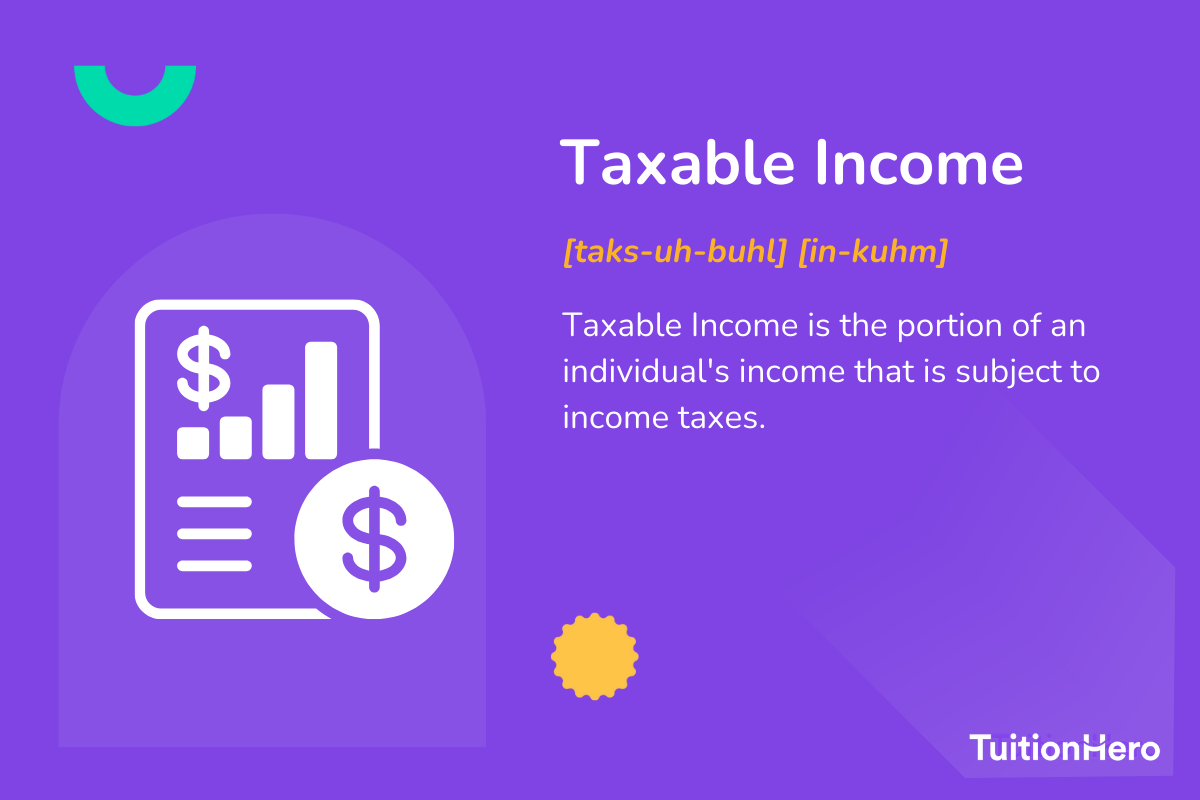Advertiser Disclosure
Last update: November 16, 2024
9 minutes read
Taxable Income
Do you know what counts as taxable income? Learn what it is, and how it shapes your financial picture.

By Brian Flaherty, B.A. Economics
Edited by Rachel Lauren, B.A. in Business and Political Economy
Learn more about our editorial standards



By Brian Flaherty, B.A. Economics
Edited by Rachel Lauren, B.A. in Business and Political Economy
Learn more about our editorial standards
Understanding what counts as taxable income is important, as it will impact your tax bill once you start working. Just like you’d look for the best student loan options for funding your education, knowing the nuances of taxable income can affect your financial planning. We'll cover key points every taxpayer should be aware of.

Key takeaways
- Understanding taxable income is crucial for effective tax planning
- Reducing taxable income can lead to big tax savings
- Be mindful of the advantages and disadvantages of different strategies
What is taxable income?
Taxable income is the portion of your gross income that the government considers subject to taxes. It includes wages, salaries, bonuses, and tips, as well as investment income and many other types of income.
However, not all income you get throughout the year is taxable. Some forms of income are partially taxable or not taxed at all. There are also deductions out there that you can take in order to reduce your taxable income, which will ultimately reduce your overall tax bill.

Students should care about your (or your parent’s) taxable income because:
- It determines eligibility for certain types of loans and grants aimed at education, freeing up more resources for tuition, textbooks, and living expenses.
- Utilizing education credits and deductions (like the American Opportunity Credit) can reduce your taxable income and your overall tax bill
- Knowledge of taxable income can lead to better financial decisions both during and after college.
Understanding what is considered taxable income helps in effective tax planning and potentially lowers the amount you owe to the government.
How to determine your taxable income
- Identify your gross income: Start by adding up all the earnings you've received over the year. This includes employment income, dividends, interests, and any other sources.
- Subtract any non-taxable income: Income from some sources isn’t taxable. This is stuff like inheritance proceeds, municipal bond income, and gifts underneath the taxable gift limit.
- Subtract other adjustments: Certain expenses like Traditional IRA contributions or student loan interest can be deducted from your taxable income.
- Deduct the greater of itemized or standard deduction: You have the option to take a standard deduction set by the IRS (for 2024, this is $14,600 for individuals, and $29,200 for joint filers), or itemize deductions like mortgage interest or charitable contributions.
By following these steps, you'll arrive at your taxable income, which is crucial in understanding your tax obligations.
Types of income not considered taxable
Some sources of income are excluded from taxable income. Here are notable examples:
- Gifts and inheritances
- Life insurance payouts
- Certain types of scholarships and grants

TuitionHero Tip
Knowing which incomes are not taxable provides clarity and can ease the tax return preparation process.
How taxable income affects student loans
Your (or your parent’s) taxable income can affect your repayment strategy and eligibility for certain types of student loans and refinancing options. Lower taxable income might reduce the amount you owe under income-driven repayment plans, which can save you a lot of money on your monthly payments.
How can you reduce your taxable income?
Reducing taxable income requires knowledge, timing, and the smart use of available resources. This guide aims to provide effective methods to lower your taxable income, potentially saving you money when tax season arrives. It's essential to approach this with a firm understanding of taxable income and the many deductions and credits available to taxpayers.
1. Contribute to retirement accounts
Contributing to retirement accounts like a 401(k) or a Traditional IRA can greatly reduce your taxable income. These contributions are made pre-tax, meaning they’re deducted from your gross income before taxes are applied.
Not only do these contributions lower your current taxable income, but they also serve as an investment in your financial future. This offers the dual benefit of reducing your taxable income today while saving for retirement in the future. Over time, the compounded growth of these savings can contribute significantly to your retirement fund. It's a perfect example of how short-term tax planning aligns with long-term financial goals.
Remember, however, that Roth retirement accounts are made with post-tax money. That means you can’t deduct Roth contributions from your taxable income for the year.
2. Use health savings accounts (HSAs)
Health savings accounts (HSAs) offer a triple tax advantage: contributions are tax-deductible, the money grows tax-free, and withdrawals used for qualified medical expenses aren’t taxed.
By maximizing your contributions to an HSA, you can lower your taxable income while setting aside money for health-related expenses. Sometimes, your company will also add or match contributions to this account, giving you extra money.
HSAs are particularly beneficial as they cater to both immediate and future healthcare costs, enabling you to prepare financially for medical needs. And remember, any money left over in your HSA can be withdrawn for any purpose after 65 as long as you pay income tax - making this account function like an extra Traditional IRA.
3. Claim education credits
For people paying for higher education, whether as students or as parents paying for their child's education, there are valuable tax credits available.
Unfortunately, after 2020, many education expenses can no longer be used to reduce your taxable income. Understanding what constitutes a financial aid package can highlight how education-related expenditures like tuition fees, books, and supplies can be effectively managed, even if they cannot be deducted.
Two tax credits, though, can help take the place of those missing deductions.
The American Opportunity Tax Credit (AOTC) is a tax credit that can be claimed for $2,500 for up to four years of a student’s college attendance. The Lifetime Learning Credit (LLC), meanwhile, can be claimed for $2,000 and has no limit on the number of years you can claim it.

TuitionHero Tip
These education tax credits not only reduce your taxable income but also make the pursuit of higher education more affordable.
4. Donate to charity
Charitable contributions can also lower your taxable income. If you itemize deductions on your tax return, donations made to qualified organizations can be deducted.
This approach allows you to support causes you care about while receiving tax benefits. Besides the immediate tax advantages, charitable giving can be part of a broader financial strategy.
It helps manage your taxable estate and promotes a legacy of giving. This strategy demonstrates how tax planning and personal values can align to generate mutual benefits.
5. Invest in tax-advantaged bonds
Investments in certain types of bonds, like municipal bonds, offer interest that is usually exempt from federal taxes and, in some cases, state and local taxes. By adding tax-advantaged bonds into your investment portfolio, you're reducing your taxable income through tax-exempt interest and diversifying your investment holdings.
Tax-advantaged bonds present an attractive option for conservative investors looking for steady, tax-efficient returns. They demonstrate how strategic investment choices can complement tax planning objectives, leading to overall financial well-being.
By executing these strategies thoughtfully, you can navigate the complexities of taxable income, ensuring you take advantage of the opportunities available to reduce your tax liability while strengthening your financial foundation. Whether it's through savings in a retirement account, investment in your health and education, philanthropy, or smart investing, each method offers its own blend of immediate and long-term benefits.
Compare private student loans now
TuitionHero simplifies your student loan decision, with multiple top loans side-by-side.
Compare Rates
Dos and don'ts for managing taxable income
Effectively managing taxable income requires a mix of strategic planning, knowledge of available deductions and credits, and timely action. Below are some do’s and don'ts to consider when looking to minimize your taxable income and maximize potential tax returns or reduce liability.
Do
Contribute to retirement accounts to lower your taxable income.
Use a health savings account (HSA) if you have a high-deductible health plan.
Keep good records of deductible expenses throughout the year.
Consult with a tax professional if you're unsure about deductions or how to file.
Educate yourself on tax laws and changes, especially those related to education and student loans.
Don't
Overlook potential deductions and credits, like education expenses or charitable contributions.
Wait until the last minute to make contributions or investments that could lower your taxable income.
Assume all types of income are treated the same for tax purposes. Different rules may apply.
Ignore tax-advantaged investment opportunities, like municipal bonds, which could diversify your portfolio while reducing taxable income.
Forget to deduct charitable contributions if you itemize deductions on your tax return.

Advantages and disadvantages of reducing taxable income
Reducing taxable income is a crucial financial strategy for many, especially those in higher tax brackets or those trying to maximize their savings. While the concept seems straightforward, the approach carries both positive and negative aspects that are worth considering.
- Lower overall tax bill
- Increased eligibility for grants and loan types
- Enhanced ability to save for retirement and other financial goals
- Potential for improved financial flexibility and security
- Complexity and the need for careful planning to avoid any legal issues
- Possible restrictions on access to credit, loans, or leases due to lower reported income
- Costs associated with employing tax-saving strategies, like investment in particular financial products or hiring a tax advisor

Why trust TuitionHero
TuitionHero simplifies education finance for students and parents. We show how income affects things like student loans and scholarships. We provide personalized advice and tools to help you make informed decisions. Let us help you manage your income to maximize your education investment and secure a brighter financial future.
Frequently asked questions (FAQ)
Taxable income plays a significant role in determining your eligibility for various financial aid and scholarship programs. Higher taxable income might reduce the amount of need-based aid you qualify for, potentially increasing your out-of-pocket expenses for education.
Yes, student loan interest payments can be deducted from your taxable income. This deduction can lower your overall tax bill, making it an essential consideration for those repaying student loans.
Education credits, like the American Opportunity Tax Credit (AOTC) and the Lifetime Learning Credit (LLC), directly reduce the amount of tax you owe. In contrast, deductions reduce your taxable income, which can indirectly lower your tax liability by placing you in a lower tax bracket.
Yes, earnings from part-time work or internships are considered taxable income. These earnings can affect your financial aid eligibility by increasing your overall income, potentially reducing the amount of need-based aid you qualify for.
Final thoughts
Dealing with taxable income means finding ways to pay less tax while following the rules. Lowering your taxable income wisely can improve your financial situation and save you money on taxes.
However, changing your income to pay less tax could have long-term effects on your finances. It's important to plan carefully and make informed decisions. TuitionHero offers resources and expert advice to help you manage your education finances effectively.
Source
Author

Brian Flaherty
Brian is a graduate of the University of Virginia where he earned a B.A. in Economics. After graduation, Brian spent four years working at a wealth management firm advising high-net-worth investors and institutions. During his time there, he passed the rigorous Series 65 exam and rose to a high-level strategy position.
Editor

Rachel Lauren
Rachel Lauren is the co-founder and COO of Debbie, a tech startup that offers an app to help people pay off their credit card debt for good through rewards and behavioral psychology. She was previously a venture capital investor at BDMI, as well as an equity research analyst at Credit Suisse.
At TuitionHero, we're not just passionate about our work - we take immense pride in it. Our dedicated team of writers diligently follows strict editorial standards, ensuring that every piece of content we publish is accurate, current, and highly valuable. We don't just strive for quality; we aim for excellence.
Related posts
While you're at it, here are some other college finance-related blog posts you might be interested in.
Shop and compare student financing options - 100% free!

Always free, always fast
TuitionHero is 100% free to use. Here, you can instantly view and compare multiple top lenders side-by-side.

Won’t affect credit score
Don’t worry – checking your rates with TuitionHero never impacts your credit score!

Safe and secure
We take your information's security seriously. We apply industry best practices to ensure your data is safe.
Finished scrolling? Start saving & find your private student loan rate today
Compare Personalized Rates




